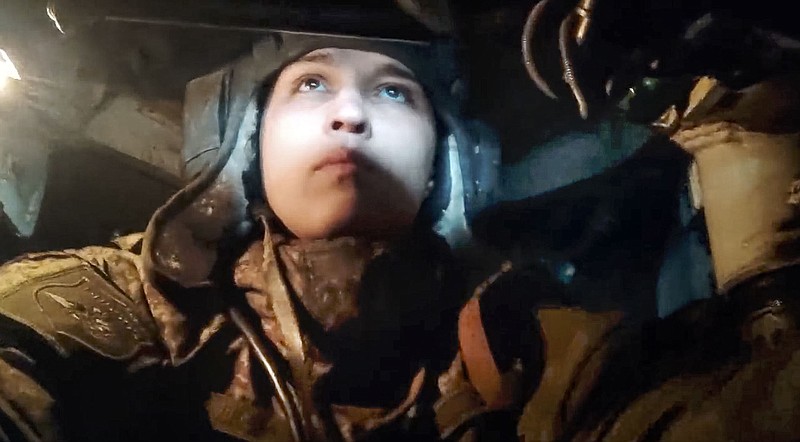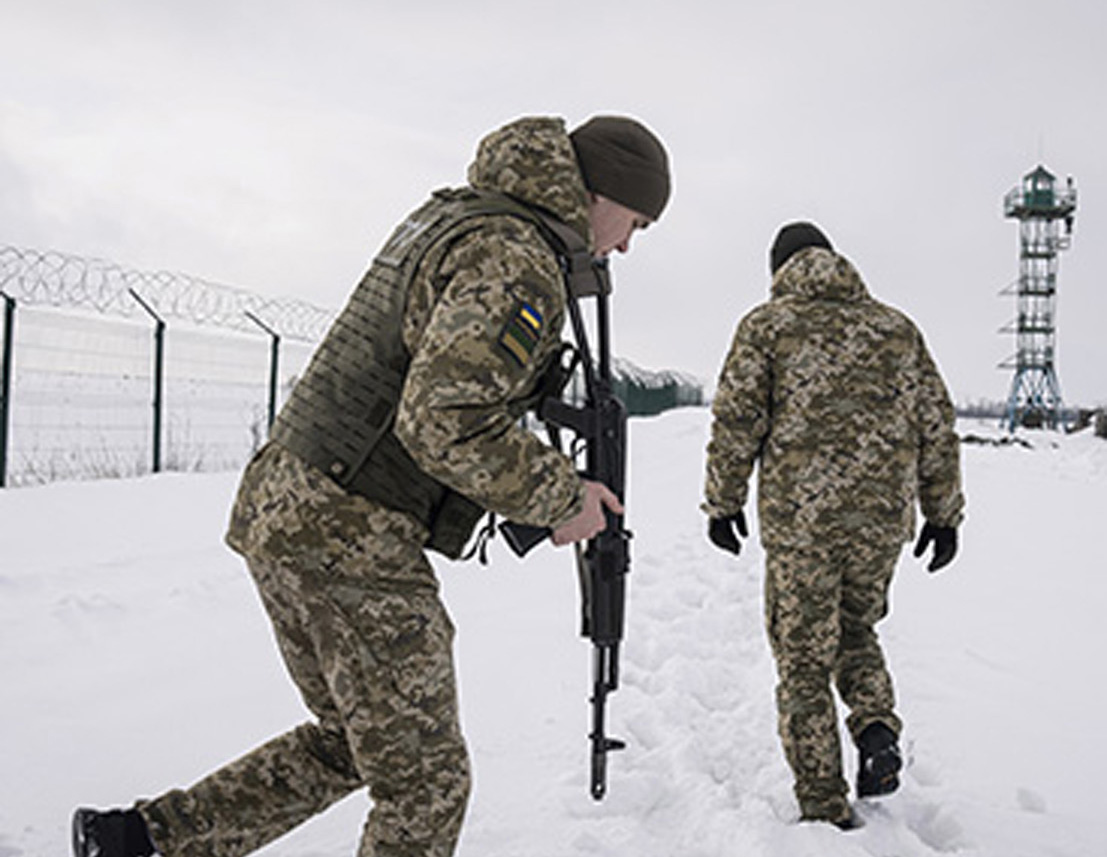WASHINGTON -- President Joe Biden is ordering 2,000 U.S.-based troops to Poland and Germany, and shifting 1,000 more from Germany to Romania, demonstrating to allies and foes America's commitment to NATO's eastern flank amid fears of a Russian invasion of Ukraine, the Pentagon said Wednesday.
The deployments are intended to be temporary, said Pentagon spokesman John Kirby, but they reflect the deepening concern over Russia's positioning of more than 100,000 troops on its border with Ukraine.
"This is not the sum total of the deterrence actions we will take, or those to reassure our allies," Kirby said, suggesting that additional "posture decisions" could be announced "soon."
Wednesday's announcement underscores the challenge Russia's military buildup has created for Biden and his national security team, who have striked a delicate balance between reassuring NATO allies seeking a greater U.S. military presence and avoiding any missteps that could inflame an already volatile situation.
The deployments coincide with increasingly hostile rhetoric being exchanged between senior U.S. and Russian officials, with Moscow's ambassador in Washington accusing the Biden administration of "demonizing" Moscow and spreading falsehoods about the Kremlin's past activity in the region.
White House press secretary Jen Psaki told reporters Wednesday that it is the Russians who are "on an escalatory path," saying, "they are the ones who have gathered tens of thousands of troops on the border; they are the ones who are threatening to invade a sovereign country."
Saying the situation "demands" that the United States reinforce Eastern Europe, Kirby told the Pentagon press corps that an Army Stryker unit of about 1,000 soldiers that's based in Germany will be sent into Romania and join some 900 U.S. troops already there. Defense Secretary Lloyd Austin discussed the move last week with top Romanian officials, who extended an invitation, Kirby said.
Additionally, about 2,000 U.S. troops from Fort Bragg, including members of the Army's elite 82nd Airborne Division, will be sent to Poland, Kirby said. Others within that group, including personnel from the 18th Airborne Corps at Fort Bragg, are expected to establish a new headquarters in Germany that will oversee the operation.
"It's important that we send a strong signal to Mr. Putin and to the world" of the U.S commitment to NATO, Kirby said, speaking about Russian President Vladimir Putin.
He said France has decided it, too, will send troop reinforcements to Romania under NATO command, and he noted that a number of other European NATO countries are considering adding forces on NATO's eastern flank. Biden and French President Emmanuel Macron touched base in a phone call Wednesday night.
NATO has been beefing up its defenses around allies in Eastern Europe since late last year.
Denmark, for example, said it was sending a frigate and F-16 warplanes to Lithuania. Spain was sending four fighter jets to Bulgaria and three ships to the Black Sea to join NATO naval forces.
The Netherlands plans to send two F-35 fighter aircraft to Bulgaria in April, and is putting a ship and land-based units on standby for NATO's Response Force.
NATO Secretary General Jens Stoltenberg said Wednesday that he welcomed the Pentagon's announcement, calling the move a "powerful signal of U.S. commitment."
"Our deployments are defensive and proportional, and send the clear message that NATO will do whatever is necessary to protect and defend all allies," Stoltenberg said.
The cavalry deployment's purpose is to "deter aggression and enhance our defensive capabilities in frontline allied states during this period of elevated risk," the Pentagon said in a separate written statement.
About 200 members of the Florida National Guard remain in Ukraine, where they are providing training to local forces and could be withdrawn quickly if necessary, Kirby said.
MISSILES DOCUMENT
Separately Wednesday, Kirby affirmed the veracity of a document -- first sent to Russian officials in December -- outlining a U.S. proposal to allow Russia to inspect and confirm that there are no Tomahawk cruise missiles at Aegis missile-launch sites in Romania and Poland in exchange for Moscow allowing similar inspections at two sites in Russia.
The document, first published by the Spanish newspaper El Pais, also warned that if the Russian military moves against Ukraine, it would "force the United States and our Allies to strengthen our defensive posture."
The communication, Kirby said, "confirms to the entire world what we have always been saying: There is no daylight between our public statements and our private discussions."
Ukraine's Foreign Minister Dmytro Kuleba again played down fears of a Russian attack in a call with reporters but said if Russia makes moves that could signal an imminent invasion Ukraine would react as necessary.
"There are no divisions between me and Secretary [of State Antony] Blinken, between President Zelensky and President Biden," Kuleba told reporters, referring to Ukrainian President Volodymyr Zelensky. "The tone of our voice may sound different, but the assessment is actually the same: We must prepare for every possible scenario."
Asked Wednesday about the latest U.S. assessment on the threat posed by Russia, Psaki said the administration has stopped describing an invasion as "imminent."
"We stopped using it because I think it sent a message that we weren't intending to send which was that we knew that President Putin had made a decision," Psaki said. "I would say the vast majority of times I've talked about it we said he could invade at any time. That's true; we still don't know that he's made a decision."
Earlier, Russia's ambassador to Washington, Anatoly Antonov, condemned the White House press secretary's characterization of Putin as having used chemical weapons and "invaded multiple countries in the past several years."
Antonov said Moscow had a better record of compliance with international chemical weapons treaties, according to comments posted on the embassy's Facebook page. He also criticized Washington's "bloody experiments" to take democracy to nations like the former Yugoslavia, Iraq and Afghanistan.
Those interventions brought the world "nothing but chaos, instability and loss of lives," Antonov said. "We encourage our colleagues to look in the mirror more often before blaming or lecturing others."
Antonov also cited Syria as a country in which the United States attempted to take democracy, but the United States never launched a military campaign there aimed at ousting Syrian leader Bashar al-Assad. Russia joined Assad in the Syrian civil war, deploying soldiers and carrying out an air campaign on his behalf, while the United States and coalition partners attacked Islamic State fighters in the country's northeast.
BACK AND FORTH
The latest back and forth between Washington and Moscow follows Russia's assertion that it would be forced into conflict with NATO if Ukraine were to join the Western military alliance and attempt to take back Crimea, which Russia annexed by force in 2014.
Speaking Tuesday in Moscow, the Russian leader accused the United States and NATO of using Ukraine to hem in Russia and ignoring the Kremlin's security concerns.
In Moscow, a senior official said the U.S. movements will complicate the crisis.
"The unfounded destructive steps will only fuel military tensions and narrow the field for political decisions," Deputy Foreign Minister Alexander Grushko said in remarks carried by the Interfax news agency.
Putin also had a new telephone exchange with British Prime Minister Boris Johnson. But readouts from both governments showed no progress, with Putin saying the West was giving no ground on Russia's security concerns and Johnson expressing concern about Russia's "hostile activity" on the Ukrainian border, referring to Putin's buildup of 100,000 troops there.
Moscow has long taken issue with NATO granting membership to countries in the former Soviet sphere, and it has demanded that the organization roll back its forces in Eastern Europe and promise that Ukraine will never join the alliance. NATO has refused to change its open-door policy allowing countries to seek entry into the alliance, whose members are bound to defend one another against attack.
The United States and Britain are considering imposing some of the toughest sanctions on Russia and on allies of Putin to deter a renewed invasion of Ukraine.
Dmitry Peskov, the Kremlin's chief spokesman, said Wednesday that Moscow was ready to defend itself against a threat to sever Russia's biggest banks from dollar-dominated international financial networks.
"We have contingency plans, risk-hedging plans and plans to minimize consequences of the unpredictable steps," Peskov told reporters.
Peskov also said there are no plans at present for further talks between Putin and Biden.
"It is always good when the presidents talk to each other. It always gives a good impetus to bilateral relations, but they do so when they deem it necessary," Peskov said.
Russia's ambassador to the United Nations, Vasily Nebenzya, suggested that he would use that body to highlight the Minsk agreements as a political solution to the Ukraine crisis.
The accords, which are viewed as generally favorable to Moscow, were brokered by Berlin and Paris after the Russian annexation of Crimea. The Kremlin has charged the West with failing to push Ukraine to implement the 2015 accord that called for a measure of autonomy in Ukraine's rebel-held east and an amnesty for Russian-backed insurgents there.
The peace deal was widely condemned by Ukrainians, and officials in Kyiv have warned that implementing it now would destabilize the country. The deal also called on Russia to end its interference in the region and withdraw troops from the Ukrainian border.
Information for this article was contributed by Dan Lamothe, Ashley Parker, Steve Hendrix, Rachel Pannett, William Branigin, John Hudson, Karen DeYoung, Chitra Wadhwani and Robyn Dixon of The Washington Post; and by Robert Burns, Lolita C. Baldor, Aamer Madhani, Lorne Cook, Dasha Litvinova, Vladimir Isachenko, Yuras Karmanau, Matthew Lee, Aritz Parra and Mike Corder of The Associated Press.

